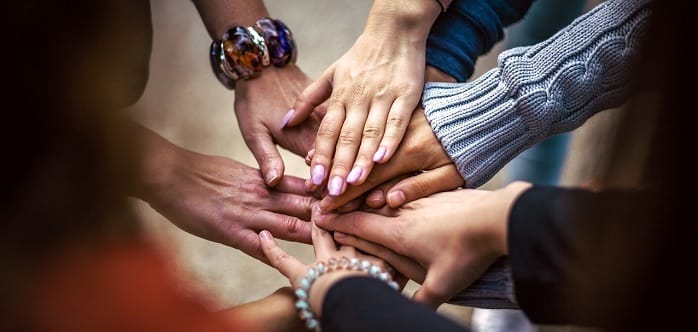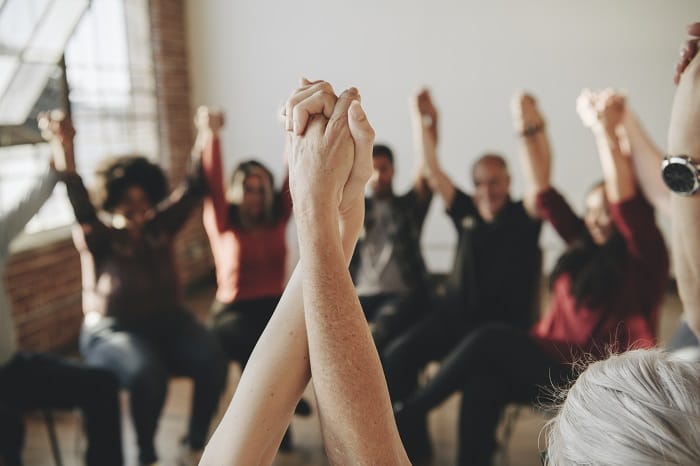Fellowship meetings are known by many different names, come in many different forms and styles, and are found all over the world – but their main aim and principles remain the same: to help individuals overcome and deal with their addiction in the long term with the support of like-minded individuals around them.
Also known as group therapy sessions, talking therapy, and better known by famous groups such as Alcoholics Anonymous (AA), these sessions bring together multiple individuals who may be struggling with similar issues.
This can include addictions to substances such as heroin, cannabis, and alcohol, but it can also include behavioural addictions such as those to gambling, sex, and shopping, for example.
This article aims to focus on how fellowship meetings can help individuals struggling with substance abuse and/or addictions, as well as what to expect in these types of treatment programmes and how they work.
Learn all about fellowship meetings and how they can support you during addiction recovery by giving our team a call on 0800 140 4690

The most well-known example of a fellowship meeting is Alcoholics Anonymous (AA).
This is a fellowship group specialised and tailored for individuals who are struggling or have struggled with an addiction to alcohol.
Alcohol is one of the most addictive substances in the world – and it is also one of the most dangerous substances that is relatively easily accessible by most people.
In the UK alone between 2019 and 2020, it was reported that over 600,000 adults aged 18 or over had a dependence on alcohol – a number that had increased by 2% from the previous year. [1]
This shows the prevalence of alcohol addictions (also known as alcoholism) within the UK and stresses the need for proper support and treatment for individuals all across the world, not just in the areas local to us.
As Alcoholics Anonymous gained popularity across the world, several specialised sub-groups have formed to cater to those suffering from specific addictions or particular circumstances that may require specialised support.
These include:
Whilst all of these groups practice the famous 12-step model of recovery, other fellowship groups follow a different approach, lessening the focus on a higher power in favour of individual empowerment and understanding.
Of these, perhaps the most famous is SMART Recovery, which places an emphasis on self-understanding through a basis of Cognitive Behavioural Therapy (CBT) to help encourage sobriety
Discover how Alcoholics Anonymous and other fellowship meetings can help play a key role in beating addiciton by talking to us on 0800 140 4690

The UK’s Membership Survey in 2020 reported that surveys of AA meetings have been conducted since 1972 and that there are many different forms of fellowship meetings [2] that have been conducted throughout this period of time.
Every individual’s addiction will affect them differently and cause different impacts on their life.
This means that every individual will benefit from different forms of treatment and therapy – not just including fellowship meetings, but all other aspects of treatment.
This means that it is vital that individuals conduct research into what form of fellowship meeting will be most suitable for them (if this is something that will be beneficial in general) before beginning any form of treatment at all.
The following subheadings outline some of the forms of fellowship meetings available in the UK today, though there are still many other forms that may take place both online and in the individual’s local area.

The most common form of fellowship meeting, group therapy is the general term for multiple individuals meeting to discuss and explore their addictions together.
This form of meeting is often led by a group leader – someone who will direct the conversation, introduce different topics, and encourage individuals to open up about their unique experiences.
During group therapy, every individual will have the opportunity to speak about their addiction, the effects it has had on their life, and any experiences of this that they would like to bring up.
Group therapy can be made up of any number of individuals, but most groups tend not to have more than 15 to 20 people in order to give everyone a chance to learn and listen from and to others.

Though not as commonly thought of as other forms of fellowship meeting, an intervention can still be considered as a form of group meeting, though it may take place during the earlier stages of care rather than the main form of treatment and/or aftercare as other forms of meeting are.
During an intervention, the individual who is struggling with addiction will meet with those around them who have been affected by their loved ones’ addiction.
This will often be mediated by a counsellor or a specialised mediator, and every individual involved will have the opportunity to speak about their experiences of addiction, even if it is not a direct experience.
After an intervention, individuals will be encouraged to enter some form of drug rehabilitation, and this decision will be guided by a medical professional or someone who is an expert in the field.
No individual will be forced to do anything that they do not want to, but this form of meeting can be extremely beneficial nonetheless.
Discover how a fellowship meeting can help you or your loved one overcome addiction by talking to our team on 0800 140 4690

There are many benefits to fellowship meetings, not only because of the social connections and situations that these meetings can encourage, but also because of the practical advice that individuals can gain from attending.
In addition, individuals are likely to gain feelings of accountability and personal growth, all while receiving suitable emotional support.
The following subheadings describe the key ways in which individuals can benefit from fellowship meetings.

As mentioned earlier in this article, all individuals will have the opportunity to share their own experiences.
This can often be an incredibly therapeutic activity, as it allows the individual to speak about topics and experiences that they may not have had the chance to speak out loud about before, either due to embarrassment or denial, making it a very freeing experience.
This may also give individuals another perspective on their issues, as speaking out loud can often draw attention to specific areas or situations which they may not have previously attended to with so much focus – something which is also common during regular therapies such as Cognitive Behavioural Therapy (CBT).

On the other hand, an individual may also choose to listen rather than speak about their own experiences.
By listening to others, an individual may learn new perspectives and views on situations that they have not previously considered.
For example, by learning about how another individual learned from a particular scenario, they may be able to apply aspects of this to their own recovery, gaining new perspectives on their addiction and also allowing them to make practical changes to their recovery journey.

As a final benefit and learning experience of fellowship meetings, individuals may walk away from these meetings with a new social support group, friends, or a network of like-minded individuals.
Not only can this help alleviate feelings of loneliness and the sense that they working through their issues alone, but it can also help an individual gain new insights as to why they are recovering in the first place.
Recovery can often leave people feeling lonely, as many people end up cutting off contact with certain individuals who encouraged or worsened their addiction, meaning that they have to create a whole new system of friends and support.
This is why fellowship meetings are so beneficial – human connection and support are some of the key values and aims that these meetings carry through, no matter where they are conducted.
Experience all the benefits of a fellowship meeting for yourself by contacting our team for free on 0800 140 4690

Though some studies suggest that it is the act of attendance itself that contributes toward the success of an individual within a fellowship meeting setting, [3] it is still important that individuals understand just what constitutes a meeting and how they are likely to occur.
Every meeting will be different depending on the focus of the particular group, the individuals that make up the group, and the individual circumstances of those involved, but there are still some general stages that make up a typical meeting.
These are outlined in the following subheadings.
This is the stage at which almost all meetings will start as it is an opportunity for new individuals to be greeted and introduced to the group, as well as mentioning any pressing matters – if any.
By introducing every individual to the group, this creates a good sense of familiarity and community within the group.
In some instances, individuals may be encouraged to wear name badges to help remind others, as well as reintroducing members who may have been there for a long time.
The group leader will lead this section, often sharing something about themselves as well to help individuals feel more comfortable in this environment.
Every different fellowship meeting will have its own unique principles and rules that they follow in order to ensure a smooth and enjoyable meeting.
For example, common rules include not talking over one another, exercising a non-judgemental approach, and engaging in active listening.
This ensures that all individuals can be heard and feel respected within the meeting, even if they have not been before or if they are unsure about the guidelines that may be in place.
This is a good opportunity for individuals to ask any questions that they may have, as well as ensure that they are comfortable and can hear everyone around them, for example.

As the main portion of the meeting, different individuals will be encouraged to share their stories and speak openly on different topics.
Sharing stories is a common exercise, in which the group leader may ask questions about the individual’s daily life, how they are coping with temptation, etc.
No individual will be forced to speak if they do not want to, but it is heavily encouraged as a way to engage with the group.
Different topics may then be highlighted by the group leader as a focus of the day’s discussion, leading others to share related experiences or their thoughts on the matters at hand.
Individuals can also be asked to bring up any topics that they are particularly interested in or if they have a desire to speak about them.
To follow this stage, the group leader may then read related materials.
This could include religious readings, poems or short stories, but this will depend on the type of group, where it is held and the individuals involved.
An individual should always feel free to make suggestions about future readings, though they should ensure that they are suitable for the group, perhaps by discussing this with the group leader before or after the sessions.
Other group activities may also be carried out, such as breaking into smaller groups to discuss particular topics, before returning to the group to share their opinions and talk more broadly.
This stage is an opportunity for the group leader to make any special announcements.
This can involve a range of different announcements such as changes to times and places of meetings, recognition of different events (i.e., birthdays, sobriety goals), as well as announcements requested by individual members.

To finish the meeting, the group leader will remind individuals of the principles of the meeting, what the individuals are working towards, as well as making a closing statement of support and hope for those who need it.
In addition, individuals may be set ‘homework’ of some form, such as thinking about a specific topic or keeping a diary in the time between meetings.
This is always optional but will often be the focus of the next meeting, meaning that individuals will benefit from this massively and their engagement will be greatly appreciated and improved.
For answers to any further questions about the typical structure of fellowship meetings for addiction recovery, talk to our team on 0800 140 4690

There are many reasons why an individual may choose to join a fellowship meeting.
Often, these forms of therapy are suggested by medical professionals – due to the many benefits of these meetings mentioned across this article.
Being a part of a fellowship meeting can be an extremely gratifying and effective method for overcoming an addiction, as well as dealing with the long-term consequences of addiction in general.
Often, seeking social support in a controlled and open environment in a fellowship meeting can be a calming and suitable treatment for individuals, making it one of the most commonly recommended treatment programmes through Rehab 4 Addiction.
Discover your path to sobriety with the help of fellowship meetings for addiciton recovery – contact us today on 0800 140 4690

In general, individuals will begin to partake in fellowship meetings during the bulk of their therapy and treatment programmes.
This will occur in the period of time after the individual has successfully completed a detox session (i.e., removed the substance from their body that has built up as a result of their physical addiction) but will begin before the begin the more part-time treatments that make up their aftercare plan.
An individual may opt to stay in these meetings long after their other treatment programmes have finished, but this is often when they start.
In addition, many individuals choose to start fellowship meetings as a part of their aftercare, as it is a way for them to stay connected to what they have learned in therapy, while also being a more independent and individual activity.
In the cases of an intervention, however, these may be used as a way to encourage individuals to begin the rehabilitation process overall, meaning that this may occur before aftercare, before therapy and even before the detox process i.e., as the first stage of rehabilitation
Learn everything you need to know about the addiction recovery process and the role of fellowship meetings within it by calling us on 0800 140 4690

Rehab 4 Addiction is a dedicated referral service that has years of experience in helping individuals find the most suitable form of rehabilitation for them.
This can start at any stage of the process but finding help as soon as possible is always recommended to reduce the chances of the individual’s addiction to exponentially worsen over time.
To find out how we can help you or someone you know, contact our addiction support line on 0800 140 4690 today.
A member of our confidential, professional and friendly team will answer any questions you may have about your addiction or the addiction of someone you know, so please do not hesitate to get in contact as soon as today.
[2] https://www.alcoholics-anonymous.org.uk/wp-content/uploads/2023/09/AA-Membership-Survey-2020.pdf